- Home
- Terry C. Johnston
Wolf Mountain Moon Page 5
Wolf Mountain Moon Read online
Page 5
“Information on Sitting Bull and the rest of the roaming Sioux,” Kelly replied, stepping between members of the colonel’s staff to move closer to Miles.
“I have no doubt of that,” Miles said before any of his officers had a chance to sputter their protests. “So, tell me, Kelly—what do I have that Bruguier needs?”
Luther gazed at the half-breed’s dark face, those flintlike eyes gazing back at him evenly, without betraying what might lie behind them. “To begin with, General—Johnny Bruguier here is trusted by Sitting Bull. Trusted enough that he was the old warhorse’s own interpreter. Isn’t that right, sir?”
“Yes—so what are you driving at?” he snapped impatiently.
Kelly continued. “Because of his important status to Sitting Bull and the rest of the hostiles, I imagine it would not be an easy thing for someone like Johnny to turn his back on all that and come over to the army side … would it, Johnny?”
For a moment the cramped cabin grew quiet. Then, still clearly bristling at the officers’ doubt of him, Bruguier stiffly responded, “No, not easy to help the soldiers.”
“A man might even feel he was committing suicide if he became a turncoat like you’re asking him, General.”
“What’s your point?” Baldwin demanded.
Kelly looked directly at Miles, saying, “I figure there’s where you can make things right by Bruguier if he betrays Sitting Bull.”
“How can this soldier chief make things right by me?” the half-breed challenged suddenly, his eyes haughty. “The army does not have enough money to make me turn my back on Sitting Bull. A man the Lakota called the Grabber did that before*—and his life is worth nothing now. One day soon, I hear, his scalp will hang from a Lakota lodgepole.”
“But I doubt you’ll ever see that scalp hanging from some warrior’s lodgepole, Johnny,” Kelly said confidently.
“Why you so sure?”
“You’ll be dead—hanged at the end of a white man’s rope.”
Luther watched the half-breed swallow hard, as if he might be imagining the fierce struggle to breathe as he danced at the end of a hangman’s noose. Then some of the fire smoldering in Bruguier’s eyes faded.
Kelly continued. “General, if you could help Johnny here clear up his murder charge with the civil authorities … I bet he’d have a reason to come over and see your side of things.”
Kelly watched the light come on behind the colonel’s eyes. With Crook and Terry bumbling and bungling things north and south, it was evident Miles had himself a clear shot at getting something done to end the Sioux War, and thereby earn his general’s star. If helping a half-breed turn his back on his mother’s people would assure him that star, Kelly had a good suspicion that Nelson Miles would likely jump at the chance.
“What would you say to that, Bruguier?” Miles asked. “When we brought you in here a few minutes ago, you babbled that you didn’t kill that man in cold blood. You said it wasn’t your fault. So tell me: if I help you get this matter straightened out—will you help me with the Sioux?”
The half-breed’s eyes widened, then narrowed. “You say you make it so I’m a wanted man no more?”
Miles straightened, running a hand down the brass eagle buttons on the front of his tunic. “Yes—that’s my pledge to you. I’ll do all I can to make sure an innocent man does not get himself hanged.”
Bruguier slowly turned on his heel, parting the officers as he stepped to the window, where he gazed at the wind-driven snow. After a minute he turned to Kelly, as if he might trust only him. “The soldier chief here—he can take the white man’s rope off my neck?”
Kelly glanced at Miles. The colonel barely nodded.
Luther asked, “Can you see that Sitting Bull surrenders at the Tongue River post?”
“Yes. I think I can do that,” Johnny replied, putting a hand at his collar, fingertips laid across his throat. “There aren’t many left with him now—chiefs and warriors. Will the Bear Coat help me?”
Without waiting for Miles to answer, Luther said, “Yes, The Bear Coat will see to it there is no rope waiting for you.”
In those next two days Johnny Bruguier began to pay for having that hangman’s noose taken from his neck.
The first item of business for Miles was the matter of some Indians the two Jackson brothers said they learned were camped up north of Fort Peck along Porcupine Creek. From Big Leggings the soldiers learned the band was not Sitting Bull’s Hunkpapa, but agency Yanktonais instead. So Miles sent Bruguier off to visit the various camps of agency Indians in the surrounding area, to tell them that their leaders must come the following morning for a meeting with the soldier chief.
On the eighteenth Miles held his audience with the Fort Peck bands, gleaning from them some idea of just where the soldiers might find Sitting Bull, as well as seeing for themselves the shabby condition of those winter roamers who once more clustered around the great chief instead of returning to their agencies. They told the Bear Coat that their horses were poor and they hadn’t had much time to hunt buffalo for meat and the hides needed to replace those lodges abandoned after the Fifth Infantry’s attack at Cedar Creek.
Kelly figured it would clearly be a long, hard winter for the hostile bands if Miles did indeed push and harry the Sioux as he had vowed he would do.
That Saturday night, after conferring with his officers, scouts, and Bruguier about dividing his command for the coming chase because of the vast amount of territory they would have to cover in the pursuit, Nelson A. Miles composed a letter to Sherman:
We have divided Sitting Bull’s people and … his strength and influence is fast breaking down…. Give me command of this whole region and I will soon end this Sioux War. … I would be very glad to govern [the hostile bands] afterwards.
In addition he once more boasted that he had done it all without the aid of cavalry—the horse soldiers that Terry and Crook had so unsuccessfully depended upon throughout the summer and into the fall.
I can hunt them down on foot…. [But] it is not easy for ten small Infy companies with broken down mules & four scouts to confine the whole Sioux nation.
And Miles was quick to tell his uncle-in-law that such an accomplishment as that would justifiably merit him either the command of a department of his own or perhaps even a stint at secretary of war in Washington City.
But he refrained from telling Sherman of the anger and disgust his men felt as they were forced to watch some of the very chiefs and warriors they had battled at Cedar Creek walking about the grounds of Fort Peck as smug and cocky as could be, carrying Henry and Winchester rifles in one hand, while in the other the Sioux clutched a ration card that guaranteed them food from the same government they had been fighting for the better part of a year. That irony wasn’t lost on many of Miles’s officers after the privations they had suffered in their cold march up from the mouth of the Tongue.
Essentially, the army knew there were three groups still out as winter closed its paw on the countryside: the Northern Cheyenne under Dull Knife and Little Wolf; the Southern Sioux, who banded with Crazy Horse and were said to be wintering south in the Powder River country; and these northern hostiles who loosely banded around Sitting Bull.
“If we don’t round them up and herd them in now, this very winter, Mary,” the colonel said quietly, speaking to his wife far, far away that night, “these same bastards will be out again come spring: resupplied, rearmed, with their ponies fattened on the government dole.”
As he went to sleep that night, Nelson A. Miles vowed he would do everything in his power to see that such a spring would never come for the Sioux.
The following morning, the nineteenth, Bruguier learned from some of the loose-lipped agency Indians that Sitting Bull’s lodges were camped about forty miles above Fort Peck in the Black Buttes region south of the Missouri. This exciting news caused Miles no small measure of pride, thinking that his presence had turned the Hunkpapa back, away from the march they first appeared to have started,
heading for the Canadian border.
That afternoon the colonel split the Fifth Infantry into two battalions. He planned to ride out personally to the west at the head of six companies—A, B, E, G, H, and I—as well as taking along the Napoleon gun, a heavy fieldpiece firing a twelve-pound shell. He spent the better part of that day ferrying over the men in those six companies to the north bank of the river and distributing rations.
At the same time Miles deployed Captain Simon Snyder to command the other four companies—C, D, F, and K—along with a small party of civilian scouts and the Rodman ordnance gun on a countermarch to the southwest, back up Big Dry Creek, where he would expect to rendezvous with Miles at the Black Buttes in eight to ten days. After Luther Kelly’s party of scouts was done scouting downriver, Kelly was instructed to rejoin Snyder’s column near the Buttes.
“My sources tell me there’s only two ways into that rugged country, Captain.”
Snyder nodded with a grin beneath his shaggy mustache. “You’ll come in the front door … and I’ll come in the back.”
“Precisely,” Miles replied, closing his hands like the jaws of a trap. “With Sitting Bull caught napping between us.”
At dawn on the twentieth both battalions were off.
In the cold, chilling darkness Miles led his men up the high ridge behind the agency buildings and onto the freight road that would lead them up the Missouri to Carroll City. But before midmorning he had his scouts turn the column away from the road, leading his battalion south by west to follow Willow Creek upstream into a barren, windswept, austere country where nothing but greasewood and cactus could survive. Under granite skies time and again the soldiers had to chop and saw tree branches they used to corduroy the creek bottom so they could make themselves a ford suitable enough for their wagons.
Back and forth they repeatedly crossed the twisting Willow, splashing up to their knees in the icy slush and soupy, sandy quicksand more than twenty times in the next two days. Up one icy hillside they would scramble, then slip down the snowy, frozen far slope as the air turned colder.
Lieutenant Baldwin rode up and halted his mount near Miles as the column below them slowly slogged its way up the convolutions of Willow Creek. “I’ve seen some bad country down on the Staked Plain before, General,” he admitted. “But I’ve never encountered anything as desolate and godforsaken as this.”
Miles took the field glasses from his eyes and nodded. “About as barren as an abandoned barn’s floor, Mr. Baldwin.”
On Wednesday the battalion awoke to find a thick, cold fog shrouding the entire countryside. With their visibility cut to less than a quarter mile, William Jackson was reduced to leading the soldiers with the aid of his compass. Early in the afternoon near the headwaters of the Willow, Baldwin requested a brief leave from the column to climb a high and prominent butte, where he pulled out his penknife and scratched into the sandstone: 5th Inf., Nov. 22, 1876.
“What do the Sioux call this place, Bruguier?” Miles asked late that afternoon after his troops had put nineteen exhausting miles behind them and were going into bivouac in a place far from the protection of the cold wind.
“Not for sure,” Johnny answered. “Maybe this is the creek Sitting Bull’s people call The Creek Where the Women Were Killed.*
Robert Jackson inquired, “How’d it get its name?”
With a shrug the half-breed answered, “Story goes the Blackfeet killed some Sioux women here years back.”
The sun rose gloriously on the morning of the twenty-third, dispelling the last remnants of chilling fog and raising the men’s spirits. That day they pushed southwest into the lush, grassy valley of Fourchette Creek, long favored by buffalo and all manner of game including grouse, prairie chickens, and sage hens. From time to time that afternoon herds of antelope would halt atop a far hill and gaze for a moment at the column of soldiers—some of whom thought the four-legged pronghorns in the distance were Sioux horsemen preparing their ambush and attack.
That night the temperature dropped all the way to twelve degrees, but by midafternoon on the twenty-fourth the temperature had climbed to fifty-eight, causing the men to sweat as they marched along the grassy banks of the Fourchette. By four P.M. Miles had them establishing camp for the night after making another twelve miles in their chase.
At breakfast on the twenty-fifth, having struggled more than a hundred miles from Fort Peck, Miles called Andrew S. Bennett to his fire.
“Captain.”
“Good morning, General.”
“I’m reinforcing your company to the strength of fifty-two men, Captain.”
“You have something in mind for me to do?”
“I want your ? Company to proceed on down this freight road to Carroll City.”
“Yes, sir,” Bennett said with enthusiasm. “What’s our assignment?”
“Some of the agency hang-abouts at Fort Peck told our half-breed interpreter that a trader was supplying ammunition to Sitting Bull’s hostiles there.”
“And you want me to take that trader into custody?”
“No,” and Miles shook his head. “Just see that you seize every last cartridge the son of a bitch has.”
“How much might this trader have?”
With a shrug and a scratch at his cheek Miles said, “I have no idea, Captain. But I’ll assign you a half dozen of our wagons to carry the ammunition.”
“Where shall I rejoin you, General?”
“You will find us in the Black Buttes area—where I plan for all of us to rendezvous with Captain Snyder’s battalion.”
*The Black Hills, often incorrectly transcribed as Paha Sapa, which means “a black hill.”
*Blood Song, vol. 8, The Plainsmen Series.
*Present-day Timber Creek.
Chapter 4
25-26 November 1876
That Saturday afternoon of the twenty-fifth, after Bennett’s B Company departed for Carroll City to confiscate that trader’s ammunition, the rest of Miles’s column reached the banks of the Missouri River itself, directly opposite the mouth of Squaw Creek a little below the Musselshell River. Here the command established its bivouac across a rich, fertile bottomland where grass grew thick not only for their livestock, but for an abundance of buffalo, elk, antelope, and deer.
One problem with the varying weather, besides the trail becoming soggy for the foot soldiers, was that the Missouri River itself was no longer a solid sheet of ice. Instead the rolling surface of the wide river was pocked with huge, bobbing chunks of ice the size of immense boulders, crashing and crushing against one another with a constant, noisy, grating rumble.
Assessing the situation upon reaching the north bank that Saturday, Miles called for his most trusted subaltern.
“Mr. Baldwin, I’m putting you in charge of constructing a raft suitable for moving the troops across.”
“I’ll move the men and you’ll caulk and float the wagons, General?” Frank inquired.
“That’s right. But we need a raft big enough to move a good number of the troops across at a time.”
“What dimensions do you recommend?”
Miles gazed up at the cottonwoods that lined the banks. “As big as you think your work details are capable of, Lieutenant.”
All through that cold night the soldiers labored within a ring of bonfires that gave them light and provided some measure of warmth as they sweated: chopping, hewing, hammering, and lashing—voices joking and buoyant as the men worked or slept in relays. By the following morning, the twenty-sixth, Baldwin was ready. Not only had his crews constructed a rope-and-log raft eighty feet long by twelve feet wide, but they had cut down several long cottonwood saplings they would use to pole their way across the river. In addition, another group of soldiers had removed one of the wagon boxes from its running gear, nailing waterproofed canvas over the box itself to make the craft more riverworthy in floating numbers of the men across the Missouri.
But that morning as the sun emerged into a gray sky, the Missouri appeared
to be running all the faster, all the more crowded with the noisy, jarring rumble of ice floes. Nonetheless, at that point Miles would not be deterred. He was not about to be kept from reaching the south bank, where he could continue his pursuit.
“Simply put,” the colonel told Baldwin, “the Fifth must push on in its hunt for Sitting Bull, no matter the obstacles thrown in our way.”
With a great shout and hearty exclamations from those hundreds watching on shore, more than ten soldiers threw their shoulders against the huge raft, shoving it across the thick ice frozen against the north bank to launch the craft into the slushy Missouri. Accompanying Baldwin on that maiden voyage was Miles himself, Lieutenant James W. Pope, and a dozen foot soldiers, nearly every one of them equipped with a twenty-foot-long sapling. In a matter of moments those poles proved themselves totally worthless against the increasing depth and speed of the current that hurled huge chunks of ice against the upstream side of the raft, where the icy river began to lap over the men’s feet, then washed around their ankles, and eventually swirled crazily around their calves the farther they went.
Just shy of the halfway point the raft lurched with a sudden jar that nearly toppled most of the men. Scrambling to hold on to the ropes, the men cried out in fear and surprise, cursing their luck. As the craft slowly came around with the persistent force of the current, the huge cottonwood timbers groaned threateningly.
“Pole men!” Baldwin ordered, fighting to keep his footing as the raft wobbled, one end free and bobbing in the current, the other snagged on a submerged tree. “Hold ’er! Hold ’er!”
The ropes strained and creaked. Cottonwood timbers grated and shuddered against one another. The river flung ice into their frail craft.
“We’re stuck fast, General!” Pope cried.
Miles demanded, “You saying we’ve gone aground?”
“I think we’re caught on a sawyer,” Baldwin decided. “A snag. Something huge, just below the surface that’s keeping us from going on.”

 Black Sun, The Battle of Summit Springs, 1869
Black Sun, The Battle of Summit Springs, 1869 Lay the Mountains Low
Lay the Mountains Low Black Sun: The Battle of Summit Springs, 1869 (The Plainsmen Series)
Black Sun: The Battle of Summit Springs, 1869 (The Plainsmen Series)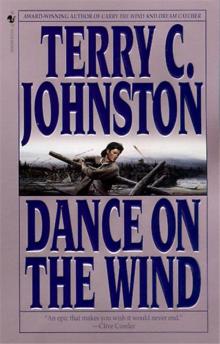 Dance on the Wind tb-1
Dance on the Wind tb-1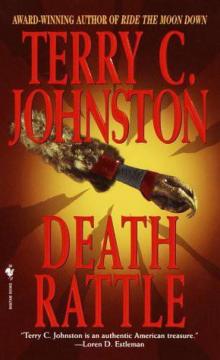 Death Rattle tb-8
Death Rattle tb-8 The Stalkers
The Stalkers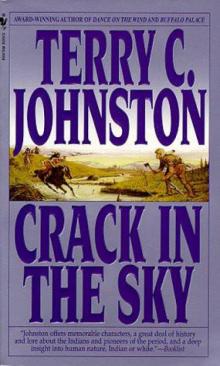 Crack in the Sky tb-3
Crack in the Sky tb-3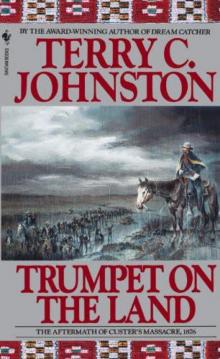 Trumpet on the Land: The Aftermath of Custer's Massacre, 1876 tp-10
Trumpet on the Land: The Aftermath of Custer's Massacre, 1876 tp-10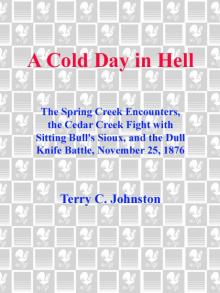 A Cold Day in Hell
A Cold Day in Hell Long Winter Gone: Son of the Plains - Volume 1
Long Winter Gone: Son of the Plains - Volume 1 Buffalo Palace
Buffalo Palace Cries from the Earth
Cries from the Earth Death Rattle
Death Rattle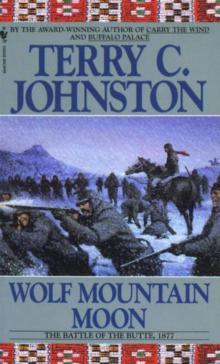 Wolf Mountain Moon: The Battle of the Butte, 1877 tp-12
Wolf Mountain Moon: The Battle of the Butte, 1877 tp-12 Crack in the Sky
Crack in the Sky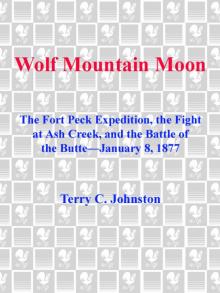 Wolf Mountain Moon
Wolf Mountain Moon Turn the Stars Upside Down: The Last Days and Tragic Death of Crazy Horse
Turn the Stars Upside Down: The Last Days and Tragic Death of Crazy Horse Winter Rain
Winter Rain Shadow Riders: The Southern Plains Uprising, 1873 (The Plainsmen Series)
Shadow Riders: The Southern Plains Uprising, 1873 (The Plainsmen Series)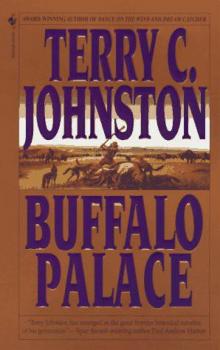 Buffalo Palace tb-2
Buffalo Palace tb-2 Cries from the Earth: The Outbreak Of the Nez Perce War and the Battle of White Bird Canyon June 17, 1877 (The Plainsmen Series)
Cries from the Earth: The Outbreak Of the Nez Perce War and the Battle of White Bird Canyon June 17, 1877 (The Plainsmen Series) Shadow Riders, The Southern Plains Uprising, 1873
Shadow Riders, The Southern Plains Uprising, 1873 Ashes of Heaven (The Plainsmen Series)
Ashes of Heaven (The Plainsmen Series) Ashes of Heaven
Ashes of Heaven Devil's Backbone: The Modoc War, 1872-3
Devil's Backbone: The Modoc War, 1872-3 Wind Walker tb-9
Wind Walker tb-9 Trumpet on the Land
Trumpet on the Land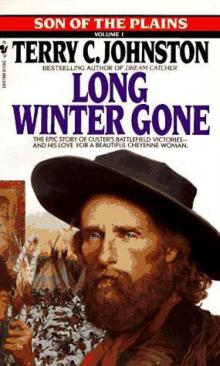 Long Winter Gone sotp-1
Long Winter Gone sotp-1 Dying Thunder
Dying Thunder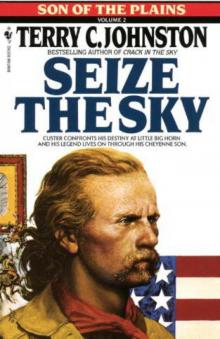 Seize the Sky sotp-2
Seize the Sky sotp-2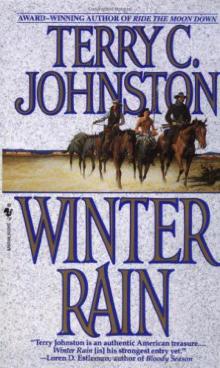 Winter Rain jh-2
Winter Rain jh-2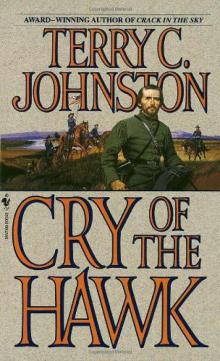 Cry of the Hawk jh-1
Cry of the Hawk jh-1 Sioux Dawn, The Fetterman Massacre, 1866
Sioux Dawn, The Fetterman Massacre, 1866 Sioux Dawn: The Fetterman Massacre, 1866 (The Plainsmen Series)
Sioux Dawn: The Fetterman Massacre, 1866 (The Plainsmen Series) Ride the Moon Down
Ride the Moon Down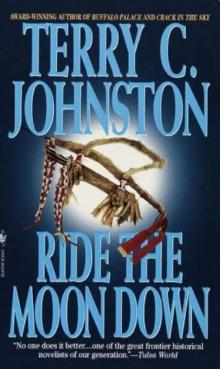 Ride the Moon Down tb-7
Ride the Moon Down tb-7 Red Cloud's Revenge
Red Cloud's Revenge Wind Walker
Wind Walker